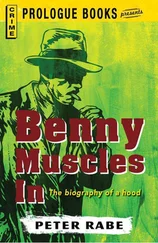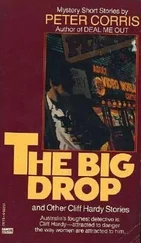Peter Rabe - The Box
Здесь есть возможность читать онлайн «Peter Rabe - The Box» весь текст электронной книги совершенно бесплатно (целиком полную версию без сокращений). В некоторых случаях можно слушать аудио, скачать через торрент в формате fb2 и присутствует краткое содержание. Жанр: Криминальный детектив, на английском языке. Описание произведения, (предисловие) а так же отзывы посетителей доступны на портале библиотеки ЛибКат.
- Название:The Box
- Автор:
- Жанр:
- Год:неизвестен
- ISBN:нет данных
- Рейтинг книги:5 / 5. Голосов: 1
-
Избранное:Добавить в избранное
- Отзывы:
-
Ваша оценка:
- 100
- 1
- 2
- 3
- 4
- 5
The Box: краткое содержание, описание и аннотация
Предлагаем к чтению аннотацию, описание, краткое содержание или предисловие (зависит от того, что написал сам автор книги «The Box»). Если вы не нашли необходимую информацию о книге — напишите в комментариях, мы постараемся отыскать её.
The Box — читать онлайн бесплатно полную книгу (весь текст) целиком
Ниже представлен текст книги, разбитый по страницам. Система сохранения места последней прочитанной страницы, позволяет с удобством читать онлайн бесплатно книгу «The Box», без необходимости каждый раз заново искать на чём Вы остановились. Поставьте закладку, и сможете в любой момент перейти на страницу, на которой закончили чтение.
Интервал:
Закладка:
Quinn felt himself become tense, not liking the remark Whitfield had made. Nor did he like the image of the goat. Being all new, he thought, is not easy. It must have been easier, before. The thought was vague and the memory was without interest. He thought of the Arab called Turk, and of Remal.
“Whitfield.”
“Yes?”
“The creep who talked to me by the quarter, he made some remark or other about Remal. That he wouldn’t allow me to walk around or something like that.”
“Sounds very vague to me.”
“That’s why I’m asking you about it, goddamn it.”
“ Please, Quinn. Don’t jab the accelerator like that. You made me spill and I shall now smell of gin.”
“God forbid,” said Quinn. “And you haven’t answered.”
“But I told you, dear Quinn. Turk loves Remal and Remal does not love him back. This causes tension, don’t you see, this causes pauses-oh, for heaven’s sake-”
At this point, Whitfield realized that he had misjudged his siesta capacity with the two bottles, which, as a matter of pride, distressed him a great deal. Stands to reason, however, he thought to himself. Bathtub alters temperature exchange, rate of metabolism and so forth, and me here with all the experimental controls shot to hell in the back of the car, so naturally. He felt better but wished he were asleep.
Quinn asked nothing else. He drove and slowly became aware of the muscles in his back. It was not a pleasant awareness and he had to think of the shell of a turtle. Going nutty, like that Whitfield back there. And without benefit of drink. He felt cramped and withdrawn.
This got worse during the hour or two he had to spend with the consul. He withheld information, faked dates and invented places, which, all in all, came surprisingly easy to him. But when he left and went out to the car where Whitfield was waiting, he felt sullen and stiff.
“Ah!” called Whitfield. “How was it to be back at the bosom of mother country?”
Quinn did not answer and walked around to the driver’s side.
“I didn’t mean to embarrass you with the question,” said Whitfield. “All I meant…”
“Stop talking a minute, will you?”
Whitfield had a headache. When it came to drinking, he felt a great deal like an athlete in training, and a headache to him was tantamount to a disqualification. And now Quinn, on top of all this, acting churlish and sullen. He watched Quinn start the car and felt ignored.
“You’re unhappy, I’m unhappy, and perhaps your friend the consul wasn’t happy either. That’s all I meant to say.”
“One month,” said Quinn. “He says it’ll take one month for investigation and papers.”
“I’d like to have a month of absolutely nothing,” said Whitfield. He had an impulse to reach back for one of his bottles, but turning his head he felt a sickening sting go through his brain. He felt out of training.
“You’ve got a month of nothing every siesta time,” said Quinn, but the joke did not interest him. The month ahead seemed like a vacuum to him, or like a view without focus.
Goat-eyes looking, thought Whitfield, and he turned his head straight, to look out through the windshield.
And all Quinn could think of, at first, was what he had been told, that he must get his papers and must get back to the States immediately.
The consul had said nothing about leaving. He had only said to comply with the local rules while awaiting his papers.
And why go back? Because the police had said so while he, Quinn, sat half dumb in the hospital bed?
There was a bend in the bare road and behind that bend came a small village. Quinn knew this but did not slow down. He leaned the car through the bend and pushed through the short village, leaving a big ball of yellow dust in the air.
Go back there for Ryder? The question seemed almost meaningless. As if long ago he had screamed all the rancor out of himself, struggled it out of himself, and had been left blank.
But what to do, what to do, staying a month in a truly foreign place, where no one meant anything to him, or everyone was somehow beyond him? How did I do it before, what did I do, filling the time and finding some tickle in it? A month of nothing-Quinn wiped his face.
“Listen, Whitfield, the boat that brought me, where is it now?”
“Oho!” and Whitfield folded his arms, closed his eyes. “That does worry you, then.”
“How come you never answer the first time you’re asked a question?”
“Because I’m a conversationalist, Quinn. Are you concerned, then, that whoever shipped you will want to finish the job once they find out where you are?”
It was put so crudely that it hardly fit, though Quinn himself could not have been more specific. But he knew he was sweating for more than the remote possibility that Ryder would send down a goon to pack him in a box again. He felt a bigger anxiety, which waved and wove about, obscuring the feeling of his helplessness, his worry that he had somewhere been wrong but did not know why. At the bottom, from somewhere, came the notion that he must always defend himself or he would sink away, and that would be fine with everybody.
He felt his back again, as once before, and how stiff his wrists were now.
“Quinn, you have a positively boxed-in look. Stop thinking. You don’t seem to be used to it. Weren’t you going to ask me something else?”
“You still haven’t answered the first thing I asked.”
“Yes. Where’s the boat? I don’t know. Ask someone else.”
“Is it back in New York?”
“Out of the question. With the run she had, I’d say she’ll be two months out yet.”
“Two months,” said Quinn.
“I follow you,” said Whitfield, and then he felt he might say something witty to make this more like conversation, but Quinn didn’t let him.
“Maybe you know about procedure in a case like this. What happens when a captain finds something irregular with his, let’s say, with his cargo, and he’s away from home port when he discovers the irregularity?”
“He dumps the mess as best he can, as he did you.”
“I don’t mean that. Does he report it to somebody?”
“Yes,” said Whitfield, “he reports it.”
Quinn said something which Whitfield did not catch, but it sounded vulgar.
“I want to know what he reports,” said Quinn.
“In this case that’s up to the captain. He’s an independent. Otherwise there’d be a company policy, such as ours, where a stowaway matter, for instance, goes out by short wave to the closest office, and the office handles the red tape from there.”
“You mean this captain who brought me has nobody to report to on this?”
“Yes, he does. Immigration, customs, that sort of thing.”
“He didn’t, by any chance, ask you to send out a report for him back to New York?”
“No. And he left the same day he came, you know.”
“And for two months he won’t be back in New York.”
“He might report by letter,” said Whitfield, “from his next port of call. Tel Aviv, I think he said.”
Quinn asked no more questions. A report on him from the consulate would get to the States long before the captain would check in, but it wasn’t at all likely that Ryder had an ear in the State Department. Only the captain, reporting to harbor authorities right in New York-He hung onto that thought for a moment but then shook his head, almost as if snapping a whip.
Farfetched, all of it. The captain was gone, glad to be rid of his troubles, New York four thousand miles away, and the Ryder thing was really over.
But why would Remal forbid me the streets? And who’s trying to steal my cans? And why does everyone think that for one month I’ll dry out in the sun in Okar, goat-eyed, watching myself turn dry and blue?
Читать дальшеИнтервал:
Закладка:
Похожие книги на «The Box»
Представляем Вашему вниманию похожие книги на «The Box» списком для выбора. Мы отобрали схожую по названию и смыслу литературу в надежде предоставить читателям больше вариантов отыскать новые, интересные, ещё непрочитанные произведения.
Обсуждение, отзывы о книге «The Box» и просто собственные мнения читателей. Оставьте ваши комментарии, напишите, что Вы думаете о произведении, его смысле или главных героях. Укажите что конкретно понравилось, а что нет, и почему Вы так считаете.












